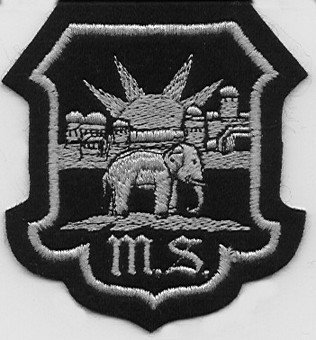Milton Sonnet
![]()
The Milton Sonnet
The Milton Sonnet first appeared in the Miltonian of November 1922 and
has appeared in every issue since April 1924. The author was never
mentioned and it was only in the golden jubilee booklet of 1960 that it
was given an attribution; subsequently it has again retreated into
anonymity.
It was in fact written by Newton Henry Dampier Spicer who was born in
Buenos Aires in 1889. He was educated in Britain and came to Southern
Rhodesia in 1907 where he joined the Native Affairs Department serving
in both Mashonaland and Matabeleland. He served as Secretary to the
Premier (Howard Moffat)in 1930 and retired from the Ministry of Internal
Affairs in 1947; he died in Salisbury on 7 April 1952.
In his spare time Spicer was a poet and five volumes of his work were
published between 1930 and 1947. He also wrote the words to several
Rhodesian school songs - and Milton's sonnet; this was not includedin
any of Spicer's own volumes but was in an anthology called "Rhodesian
Verse 1888-1938 published in England in 1938.
Spicer's son , John, attended Milton in the early twenties when his
father was Native Commissioner in Bulawayo. Spicer coached the school
swimming and water polo teams and, according to his son, had numerous
friends on the staff. It does not seem to be known whether the sonnet
was a spontaneous tribute to the school or a commissioned work.
Some of its references are now somewhat archaic, perhaps always were;
Latema refers to the battle of Latema Hill, fought on March 11-12, 1916,
during the Kilimanjaro campaign - the hill is now situated on the border
between Kenya and Tanzania. British casualties numbered some 270 killed
or wounded and on the first day of the battle the 2nd Rhodesia Regiment
took part in the engagement, suffering 16 killed and 45 wounded, among
whom were two Old Miltonians, Privates Thomas Ely and Reginald Johnston.
"Flanderscorn" is self explanatory and at least seven OMs died on the
Western front. Achi Baba was a hill around which raged one of the more
ferocious parts of the Gallipoli campaign in April/May 1915; only one
Rhodesian died there, Lieutenant L. Webber , and he was not an Old
Miltonian. In the last line Spicercouples Milton's motto with the
further injunction from St Paul's First Epistle to the Corinthians -
"Quit ye like men, be strong" ( Ch. 16 v 13 ).
Writing in 1975 of Milton's continued use of the sonnet, the Deputy
Headmaster, Mr. Dry, remarked: "The language and style of the poem are
stilted and unmodern, but the spirit and truth it contains can never
fade and for that reason I am glad that it is printed year after year.
It was written for Milton and it belongs to us forever.
"The men who fought in the Great War, like those who guard our frontiers
now, were ordinary men, but doubtless they gained strength and courage
from their attempt, consciously or unconsciously, to live up to the old
and undying virtues - implied in our motto - of selfless manliness.”
The future holds many changes for all alike. For Miltonians, we must
stand firm and face these changes supported by 68 years of sound
principles and firm traditions. As Newton Spicer has said in his sonnet,
“Be strong; be strong! “and face future battles as those great men on
Latema Hill and on Flanders Fields.
Here is no ancient pile all stained and scarred
By centuries of rain and blasting storm,
Yet in the few short years since thou wast born,
No backward look thy spreading fame has marred.
Forth went thy sons when jealous races warred,
Died at Latema, and 'mid Flanders corn.
While Achi Baba grim and battle worn
O'er Milton graves eternally keeps guard.
Proud was the man whose noble name you bear
Could he behold the inmates of your walls.
O'er half a continent thy summons calls
Fathers to place their sons in Milton's care.
Throughout this land thy cry rings loud and long,
"Oh quit yourselves like men, Be strong, be strong!"
Since 1924 the magazine has been prefaced every year by a sonnet written
by Newton Spicer.
The language and style of the poem are stilted and unmodern; but the
spirit and truth it contains can never fade, and for that reason I am
glad that it continues to be printed year after year.
It was written for Milton and it belongs to us forever. My purpose here
is very simply to draw your attention to it.
The poem honours in particular those 13 men from Milton who died in the
First World War. The poet refers to battles in Flanders, in memory of
which red poppies are still sold every November; the grim Achi Baba he
speaks of was the dreadful hill in the Gallipoli which the Allies could
never quite capture in eight months of fighting.
"Latimer" is probably a misprint for Latema on the border of Kenya and
Tanzania. In March, 1916, sixty Rhodesian soldiers were killed or
wounded in a battle there, and among the dead were Old Miltonians Thomas
Ely and Reginald Johnstone.
The men who fought then, like those who now guard our frontiers, were
ordinary men, but doubtless they gained strength and courage from their
attempt, consciously or unconsciously, to live up to the old and undying
virtues, implied in our school motto, of selfless manliness
![]()
